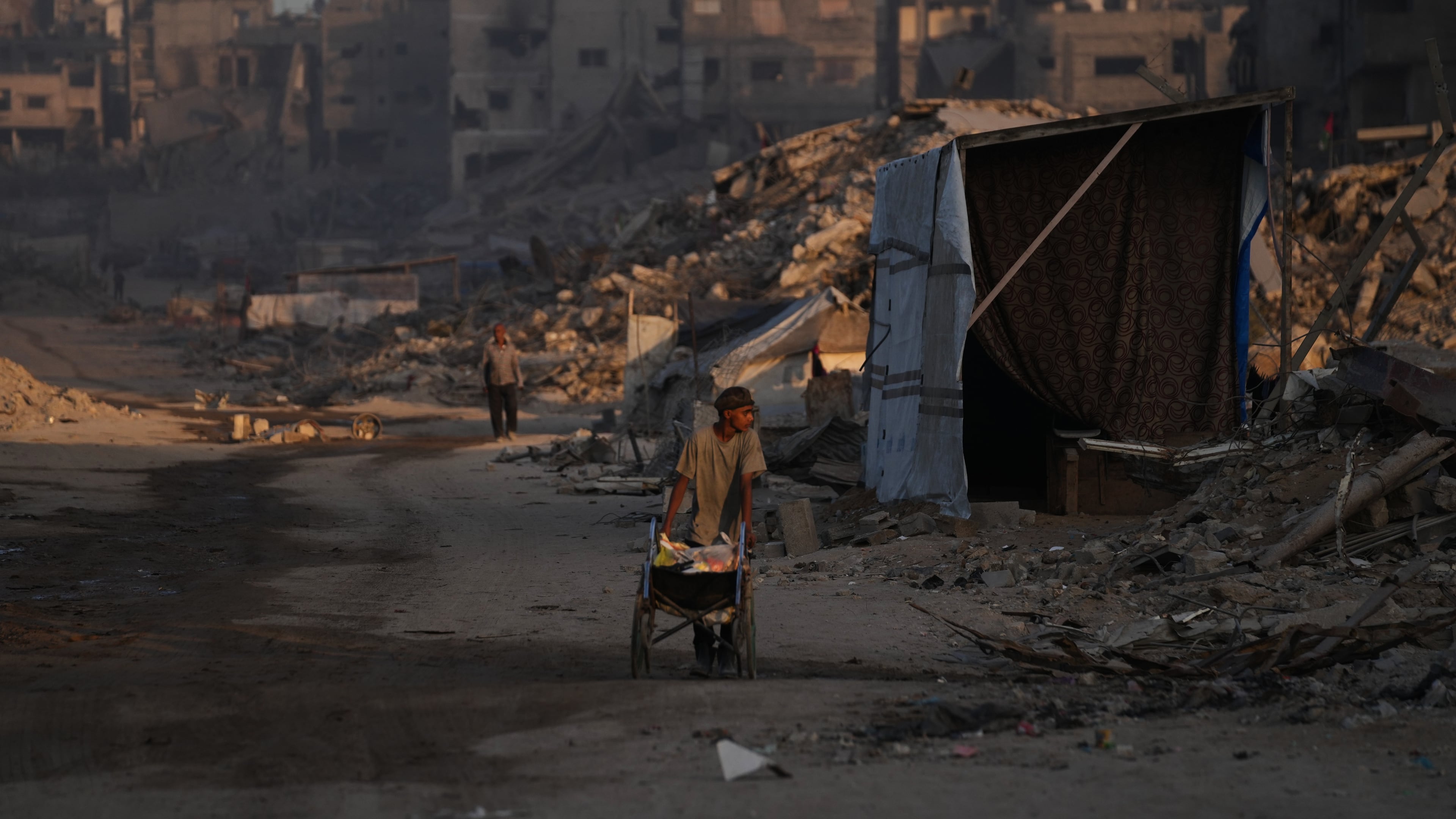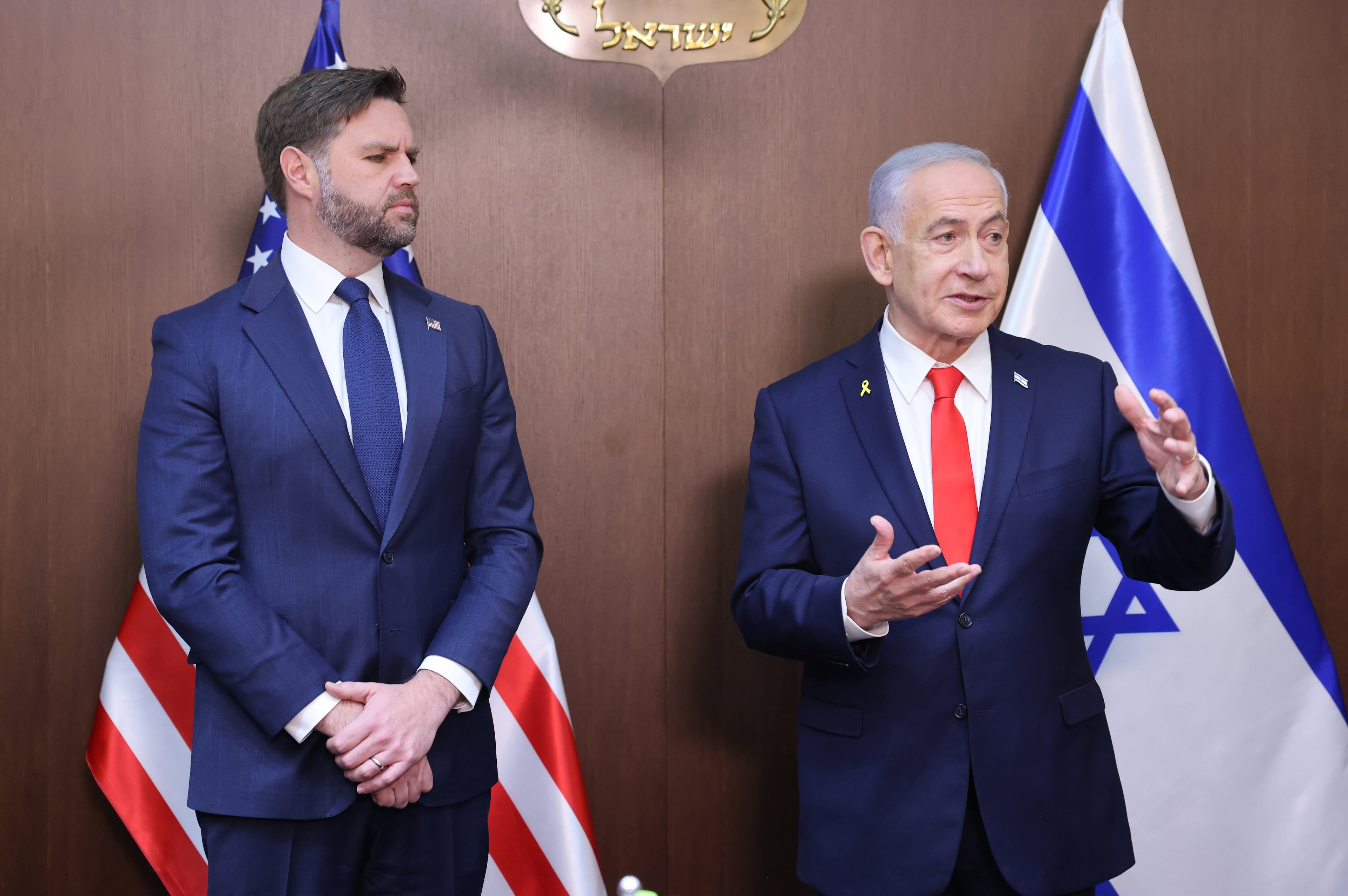Vance denies the US dictates to Israel as he meets with Netanyahu over Gaza ceasefire

TEL AVIV, Israel (AP) — U.S. Vice President JD Vance sought Wednesday to ease concerns in Israel that the Trump administration was dictating terms to its closest ally in the Middle East, as he and other top U.S. envoys visit Israel this week to support the Gaza ceasefire agreement.
“We don’t want in Israel a vassal state, and that’s not what Israel is. We want a partnership, we want an ally,” Vance said beside Prime Minister Benjamin Netanyahu, in response to a reporter’s question about whether Israel was becoming a “protectorate” of the U.S.
Netanyahu — who will meet with visiting U.S. Secretary of State Marco Rubio on Friday — expressed similar sentiments while acknowledging differences of opinion as they push forward the U.S.-proposed ceasefire agreement.
“One week they say that Israel controls the United States. A week later they say the United States controls Israel. This is hogwash. We have a partnership, an alliance of partners who share common values, common goals,” Netanyahu said.
One concern in Israel is that an international security force in Gaza — envisioned in the ceasefire's second phase — could limit the Israeli military’s ability to take action in the Palestinian territory if it perceives a threat to its own security.
Vance acknowledged that the road to long-term peace is challenging, with the ceasefire less than two weeks old, but tried to maintain the buoyant tone he sounded Tuesday after arriving in Israel.
“We have a very, very tough task ahead of us, which is to disarm Hamas but rebuild Gaza to make life better for the people in Gaza, but also to ensure that Hamas is no longer a threat to our friends in Israel. That’s not easy,” Vance said. “There’s a lot of work to do, but I feel very optimistic about where we are.”
Vance also met with relatives of Israeli hostages. He was accompanied by U.S. Middle East envoy Steve Witkoff and Jared Kushner, President Donald Trump’s son-in-law.
UN court rules on aid to Gaza
The International Court of Justice said on Wednesday that Israel must allow the U.N. aid agency in Gaza, known as UNRWA, to provide humanitarian assistance to the territory.
The Hague-based court was asked last year by the U.N. General Assembly to determine Israel’s legal obligations after the country effectively banned the agency, the main provider of aid to Gaza, from operating there.
Israel “is under the obligation to agree to and facilitate relief schemes provided by the United Nations and its entities, including UNRWA,” ICJ President Yuji Iwasawa said.
Israel has denied it has violated international law, saying the court’s proceedings are biased, and the country didn’t attend hearings in April. UNRWA has faced criticism from Netanyahu and his far-right allies, who claim the group is deeply infiltrated by Hamas.
Questions about ceasefire plan's next steps
Uncertainty surrounds next steps in the ceasefire, including the territory's postwar governance and the disarming of Hamas.
Vance said Tuesday officials are brainstorming on the composition of the international security force, mentioning Turkey — with whom Israel has had tense relations in recent years — and Indonesia as countries expected to contribute troops. Vance was flanked by flags from a number of countries expected to participate, including Germany, Denmark and Jordan.
An Israeli official said the issue of Turkish participation in the security force was discussed in the meeting between Vance and Netanyahu, and that Netanyahu expressed his opposition to Turkish troop presence. The official spoke on condition of anonymity because they were discussing closed diplomatic talks.
Meanwhile, in an apparent effort to embarrass Netanyahu during Vance’s visit, far-right politicians in the Israeli parliament on Wednesday took the symbolic step of giving preliminary approval to a bill that would give Israel authority to annex the occupied West Bank – a move that the U.S. opposes.
The bill passed in a 25-24 vote. It is unclear whether the bill has support to win a majority in the 120-seat parliament, and Netanyahu has tools to delay or defeat it.
Returns of remains on both sides
Israel said Wednesday it completed the identification of the remains of two more hostages that were handed over on Tuesday. Arie Zalmanovich and Tamir Adar were killed in Kibbutz Nir Oz during the Oct. 7, 2023, attack by Hamas militants which triggered the war.
Since the ceasefire began on Oct. 10, the remains of 15 hostages have been returned to Israel. Another 13 need to be recovered in Gaza and handed over, a key element of the ceasefire agreement.
In Gaza, the Health Ministry said Wednesday that Israel returned the bodies of 30 Palestinians. That brings the number of bodies of Palestinians returned to Gaza to 195, of whom 57 have been identified by families, according to the ministry, which operates under the Hamas-run government.
Dozens of people gathered outside Nasser Hospital in Khan Younis on Wednesday for funeral prayers over the bodies of 54 Palestinians returned since the ceasefire began.
A senior health official in Gaza has said some of the bodies bore “evidence of torture” and called for an investigation.
Israel has not provided identification for the bodies or explained their origins. They could include Palestinians who died during the Oct. 7 attack, detainees who died in custody or bodies taken from Gaza by Israeli troops during the war.
Israelis bid farewell to Thai hostage killed in 2023
Thousands of people in Israel on Wednesday attended the funeral of Tal Haimi, who was killed during the Oct. 7, 2023, attack that started the war, and whose remains had been returned from Gaza a day earlier, according to a statement from the Hostages and Missing Families Forum.
Israelis were also set to bid farewell to a Thai farmworker whose body will be repatriated. Sonthaya Oakkharasri was killed during the Oct. 7 attack. His remains were returned last weekend.
Hamas-led militants in that attack killed around 1,200 people, mostly civilians, and abducted 251 others.
The Israel-Hamas war has killed more than 68,000 Palestinians, according to Gaza’s Health Ministry, which does not distinguish between civilians and combatants in its count. The ministry maintains detailed casualty records that are seen as generally reliable by U.N. agencies and independent experts. Israel has disputed them without providing its own toll.
___
This story was first published on Oct. 22, 2025. It was updated on Oct. 22, 2025 to correct that Israeli Prime Minister Benjamin Netanyahu’s office did not issue a statement that said: “We are not a protectorate of the United States. Israel is the one that will decide on its security.” In response to a reporter’s question about whether Israel was a “protectorate,” Netanyahu called the notion “hogwash.” ___
Josef Federman contributed from Jerusalem.
___
Follow AP’s war coverage at https://apnews.com/hub/israel-hamas-war

